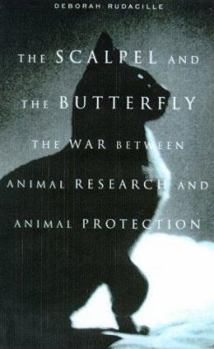The Scalpel and the Butterfly: The War Between Animal Research and Animal Protection
Select Format
Select Condition 
Book Overview
In this sweeping history of animal research and the animal protection movement, Deborah Rudacille examines the ethical question of whether enhancement of human life justifies the use of animals for... This description may be from another edition of this product.
Format:Hardcover
Language:English
ISBN:0374254206
ISBN13:9780374254209
Release Date:September 2000
Publisher:Farrar Straus Giroux
Length:389 Pages
Weight:1.45 lbs.
Dimensions:1.2" x 6.3" x 9.2"
Customer Reviews
2 ratings
Historically on the money, and nice reading, too...
Published by Thriftbooks.com User , 15 years ago
This book presents a well-documented history of the animal protection movement and the largely antagonistic relationship that has existed between animal protectionists and the biomedical research community since the mid-19th Century. Rudacille combines thorough documentation of sources with incisive analysis and first-hand professional experience to create a book that animal researchers, laboratory technicians, veterinarians, animal care committee members and anyone else who has a stake in animal welfare and/or research should read. Indeed, Rudacille's free-flowing prose makes for easy, fast and informative reading -- just the ticket for busy scientists, vets and "techs" who aren't yet familiar with this history, and who "don't have time for this stuff, anyway." Readers who may already be familiar with this topic will find that Rudacille has been accurate with the facts and fair with her analysis. She contrasts the new breed of 19th Century scientists who embraced animal experimentation as the key to understanding human physiology and curing disease with the equally new breed of social activists, mostly female, it turns out, who were horrified and repulsed at the mere thought of someone invading living bodies of sentient creatures for any purpose, but especially for mere "science." In tracing the development of the animal protection movement from those beginnings, Rudacille skillfully explores and clarifies the roots, relationships and interconnectedness of some main-stream modern-day animal protectionist and antivivisectionist societies. Her inclusion of pertinent biographical details on some of the more prominent players in these groups adds to the reading enjoyment. Rudacille's analysis leaves little doubt that the conflict between animal welfarists and the animal research community is here to stay, at least for as long as our society continues to believe in and support animal research. Her basic message is that the warring factions must find some reasonable middle ground that serves the interests of both groups. How difficult that task may be comes clear when one realizes that the battle cry of the 19th-Century antivivisectionists ("animal research is useless") is the same as that of their modern-day counterparts, as repeatedly quoted by Rudacille throughout this book. Outfit these modern nay-sayers with long dresses, bustles and parasols, and we're back in the 19th Century. In the end, this book is more than an entertaining historical read. It shows with great clarity how deep the roots of opposition toward animal research extend, and it underscores the importance of participation in the dialogue -- some would say the war -- between members of the biomedical research community and those animal welfarists who are willing to engage in discussion. Sadly, many of my colleagues in the research community hardly know there's a war on, much less that they're in the army that's supposed to be fighting it.
Informative Source on Animal Experimentation
Published by Thriftbooks.com User , 21 years ago
I read Rudacille's book at a time when I needed to make an important ethical decision about animal experimentation.The book provides many historical references about the subject. It is not one-sided. Its shows both historical references pro-animal experimentation, for example in the chapter about the polio, as well as evidence against animal experimentation, for example in the chapter about the Nazi human experimentation. Moreover, the back of the book contains pointers to other resources (including the Internet) for further reference.The book did not biased my decision. When I finished reading the book I was as confused as when I started but I was considering more elements in my decision.In summary I found in the book a good and not biased source of historical information about the ethical issues of animal experimentation.




